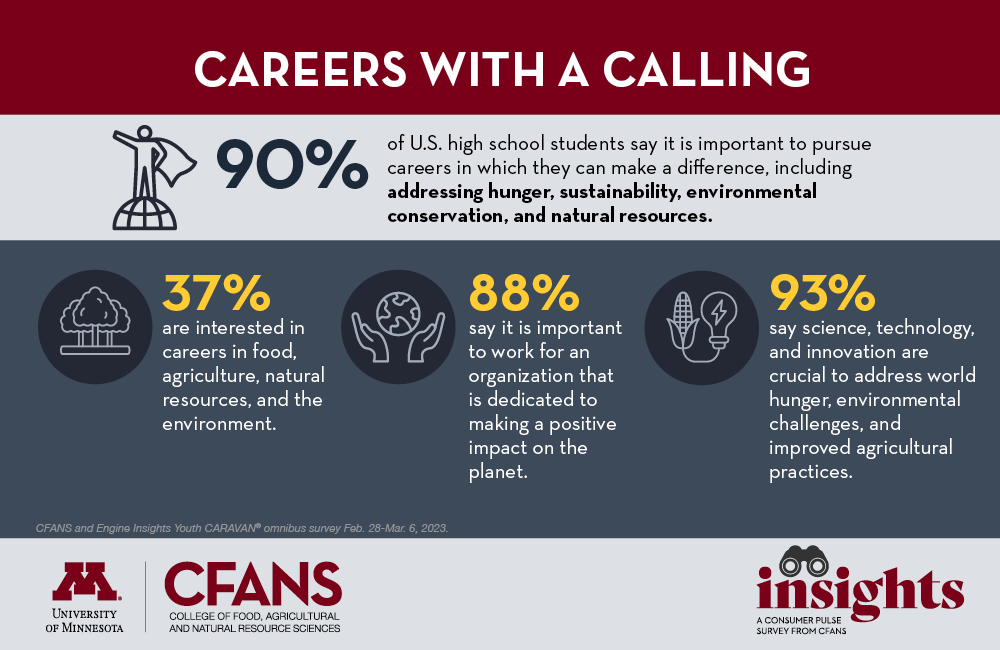
Careers with a calling — U.S. teens seek more than just work
CFANS Insights survey shows that 90 percent of high schoolers are interested in careers that make a difference in solving global challenges

From rising world hunger to dwindling natural resources, America’s teens are concerned about the complex challenges facing the world today – and they want to do something about it.
A new CFANS Insights survey conducted by the University of Minnesota’s College of Food, Agricultural and Natural Resource Sciences (CFANS) takes a closer look at U.S. high schoolers’ perspectives on their future careers. According to the survey, 90 percent of respondents indicated it was important to pursue careers in which they can make a difference, including addressing hunger, sustainability, environmental conservation, and natural resources.
To tackle these challenges, 93 percent of high schoolers surveyed said that science, technology, and innovation will play a crucial role, and 37 percent are interested in careers in food, agriculture, natural resources, and the environment.
“It’s heartening to see that today’s high school students are both deeply concerned about the challenges facing the world today, and motivated to make a difference,” said Frances Homans, professor and interim associate dean for CFANS Academic Programs and Faculty Affairs. “At CFANS, we use science to find answers to the world’s greatest challenges and to do so we need students with a passion for solving the problems of today and tomorrow.”
That science is applied across a wide variety of CFANS majors and minors that address students’ interest areas. For example, the fisheries, wildlife and conservation biology major at CFANS has seen a 76 percent increase in undergraduate enrollment over the past eight years. This aligns with today’s survey results showing that 87 percent of high schoolers are concerned about protecting natural resources.
Driven to make a difference
For University of Minnesota student Madison Stoltzman, the survey results echoed her own feelings when she was a high schooler. She, too, was driven to choose a major where she felt she could impart positivity in the world and find a fulfilling career. This led her to the Department of Bioproducts and Biosystems Engineering (BBE).
“The department’s emphasis on sustainability garnered huge appeal, but food engineering and food systems fit my career ambitions and personal values perfectly,” she said. “Food, a fundamental component of life, is an underrated medium for identity, culture, and life. Yet so many people struggle to maintain access to safe, sustainable, and nutritious sources of food. I believe that this truth is unacceptable. I chose to study food engineering and food systems to fight for equitable access.”
A highlight of her collegiate experience so far has been a summer internship at SunOpta, a sustainable food and beverage production company. She looks forward to traveling with fellow BBE students to study sustainable food systems in Italy this spring.
Good news for sustainability-focused organizations
When it comes to finding future employment, the majority of high schoolers surveyed said they will be looking for careers with organizations that care about sustainability. Eighty-eight percent of respondents indicated it’s important to work for an organization that is dedicated to making a positive impact on the planet.
This is welcome news to companies like Minnesota-based Cargill, a global provider of food, agricultural and industrial products and services. The company works with CFANS on numerous initiatives, including as a founding member of the Plant Protein Innovation Center, an interdisciplinary research center dedicated to studying plant and alternative proteins, and the Cargill thrive Scholarship Program, which aims to ensure more equitable access for women and BIPOC students pursuing careers in STEM, business, and agriculture.
"At Cargill, we work hard every day to nourish the world in a safe, responsible, sustainable way," said Quincy Wimbish, diversity recruiting and sourcing specialist at Cargill. "Our employees around the world are deeply committed to our purpose, and as we recruit new talent, we look for people with a passion to change the world for the better. It is encouraging to see that so many high school students want to pursue careers with a greater purpose — they are our future."
Authentic and hands-on learning experiences
Beyond the classroom, CFANS provides students with practical experiences to develop valuable skills for their careers. Candice Hirsch, associate professor in the Department of Agronomy and Plant Genetics, says she is fortunate to work with many undergraduate students in her research lab, which focuses on improving the genomics of corn.
"Through the hands-on, authentic research experiences they participate in with our group they are gaining technical skills and the ability to work through the scientific method, while also making significant contributions towards our larger research goal of improving corn genetics,” said Hirsch. “Together, we can be a powerful force for change.
About the CFANS Insights Survey
The CFANS Insights survey is a consumer poll that explores key perceptions and opinions about important topics in food, agriculture, and natural resources. This Youth CARAVAN survey was conducted Feb. 28 - March 6, 2023, by ENGINE INSIGHTS among a sample of 1,006 high school students ages 13 to 17 across the U.S.





